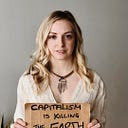I will NEVER say you must be vegan, but I will say this instead…
To get more articles like this straight to your inbox, subscribe to The Joy Thief newsletter.
Veganuary is over and whether you tried it out or not, I want you to know that I will never tell you that you MUST be vegan. NEVER. Don’t get me wrong, there was a time I probably would have, but I’ve grown as I’ve learnt about food injustice and intersectionality. It’s those learnings that I want to share with you today, so here’s what I will tell you…
Side note: If you have no idea what Veganuary t is then… WOW! Who are you, and what rock are you living under? (Cause I kinda wanna join you). Just to keep you informed though, Veganuary is a British non-profit that promotes and educates about veganism via a popular eat vegan challenge that lasts for the whole of January. When I say popular, I mean, like, half a million people popular…
You don’t HAVE to be vegan to be environmentally conscious.
Cutting down on meat and dairy is impactful, but there are other means of being environmentally conscious. Besides, there are plenty of valid reasons why people aren’t vegan. Health, money, time, access, culture, etc.
Privilege makes it easier to be vegan.
In the same way that not having good health, money, time, access, or a culture that is open to veganism can be things that stop you becoming vegan, having those things can make it easier to be vegan.
No matter what you eat, your plate isn’t free of injustice.
Fellow vegans, this includes us, and I am not sorry to drop this truth bomb… Food injustice exists beyond animal welfare. In fact, most of our food system relies on methods that routinely expose people to harmful toxic chemicals that increase the risk of illness. Furthermore, nearly all farmed foods require the physical labour of people, usually people of colour in the global south or USA, who are paid poorly & RARELY given the autonomy to own the land they work upon, keeping people who have histories of being colonized, enslaved, and marginalized within the oppressive capitalist system. Some of your food is DEFINITELY attached to these issues.
Food injustice is a climate justice issue.
Approximately 20% of global emissions comes from agriculture. As climate change pushes global temperatures closer to 1.5C warming the amount of farmable land will decrease — in fact, it already has decreased (in the last 4o years we have lost a third of land able to sustain crops) — which means we can expect food shortage. We know that what is unequal now is amplified during a crisis, so anyone without access to quality food now, likely won’t in the future is we continue on our current course.
Food injustice is a racial issue.
The thing about climate change… it doesn’t impact everyone equally. Those in the global north — majority white countries — will escape the impacts of climate change for far longer that most people in the global south -majority people of colour — simply because the countries in the global south are seeing climate change NOW. Temperature increases, desertification, drought, flooding, storms, crop failure…. All amounting to food shortage and insecurity. Again, I must stress this is happening NOW.
Food injustice is a class issue.
Not everyone in the global south will be food impoverished, and not everyone in the global north will be food secure. In the global south those who can afford to live away from areas frequented by climate disaster, or else have the money to find stability after a climate disaster will prosper over the poorer communities. In the global north, poorer communities (again, disproportionately POC) live in food deserts with no access to fruit and veg. In some cases, it can literally be cheaper to buy cheap meats and frozen ‘junk’ food than lots of fresh foods.
After reading this, why do you some people (some vegans in particular) care more about harm to animals than humans? Is animal abuse more visible, less acceptable, less necessary? I’d say HELL NO. But skin colour and the benefits that white people gain from the labour of people of colour and the poor does influence the narrative. NO MATTER WHAT YOU EAT, oppression and injustice exist in your foods networks.
Actions
Learn: Where your food comes from, who farms it, and the injustices they face. This includes the history and connection between slavery and agriculture.
Donate: Money, time, or resources — if you have them — to local community gardens and food accessibility movements.
Did you enjoy this read? Subscribe to my newsletter.
